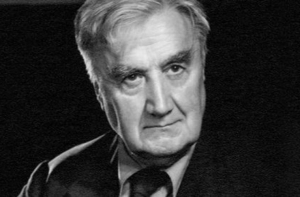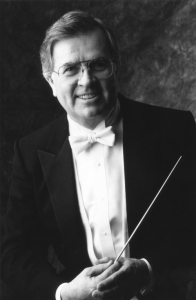#225– November 13, 2023

https://youtu.be/zlEIbkchGrw?si=_bEuvD6GLdVdX_7N
Variations for Wind Band by British composer Ralph Vaughan Williams is our Composition of the Week.
We also commemorate this famous version scored for large wind ensemble in memory of Donald Hunsberger, who passed away on Sunday, November 5, 2023, at the age of 91.
His immense contribution to the wind ensemble world is invaluable. Among the large number of works orchestrated and arranged for this medium, the Vaughan Williams’ Variations are emblematic.
The version heard here is the first studio recording made by Don Hunsberger and the Eastman Wind Ensemble, which he conducted from 1965 to 2002.
In words of WASBE’s immediate Past-President and Hunsberger’s former student, Jim Ripley:
“The world of wind music has lost one of its most revered pillars, and those who knew him have lost a cherished friend and mentor. […] Don’s connection to WASBE was strong and of great importance. A charter member of the association, he followed carefully its proceedings and advancements. Much of his scholarly work, editions and transcriptions would be staples for study and performance throughout the world. His advancement of the wind ensemble as a medium of serious artistic merit is a cornerstone of the WASBE mission. He directly promoted collaborative WASBE sessions with the 40th Anniversary celebration of the Eastman Wind Ensemble in 2001 and was featured as one of the “Three Icons” for the 2009 WASBE Conference in Cincinnati.”

“Ralph Vaughan Williams was commissioned to write his Variations for the 1957 National Brass Band Championship of Great Britain, held every year at the Royal Albert Hall in London.
This great British Brass Band tradition has been a major event in the country since 1860.
Variations for Brass Band was first transcribed for orchestra by Gordon Jacob (1895 – 1984) and renamed Variations for Orchestra, and subsequently transcribed for wind band by Donald Hunsberger as Variations for Wind Band.
According to the critic of The London Times after the premiere in 1957: “It is no exaggeration to say that this is the finest piece of music ever written for Brass Band.”
Vaughan Williams used the four-bar opening theme from the Variations in his Symphony No. 9 in E Minor, which he was writing concurrently. Although the theme is original, it is influenced heavily by British folk songs, which Vaughan Williams had researched extensively, as evidenced by the “sweeping lyrical lines, bold choral-like statements, florid figures, delicate intertwining solo lines, use of modal writing and harmonies, and counterpoint” that he included in the Variations”. (Program Notes by Victor Markovich)
Ralph Vaughan Williams works include operas, ballets, chamber music, secular and religious vocal pieces and orchestral compositions including nine symphonies, written over sixty years. Strongly influenced by Tudor music and English folksong, his output marked a decisive break in British music from its German-dominated style of the 19th century.
Vaughan Williams was born to a well-to-do family with strong moral views and a progressive social life. Throughout his life he sought to be of service to his fellow citizens and believed in making music as available as possible to everybody. He wrote many works for amateur and student performance. He was musically a late developer, not finding his true voice until his late thirties; his studies in 1907–1908 with the French composer Maurice Ravel helped him clarify the textures of his music and free it from Teutonic influences.
Vaughan Williams is among the best-known British symphonists, noted for his very wide range of moods, from stormy and impassioned to tranquil, from mysterious to exuberant. Among the most familiar of his other concert works are Fantasia on a Theme by Thomas Tallis (1910) and The Lark Ascending (1914). His vocal works include hymns, folk-song arrangements, and large-scale choral pieces. He wrote eight works for stage performance between 1919 and 1951. Although none of his operas became popular repertoire pieces, his ballet Job: A Masque for Dancing (1930) was successful and has been frequently staged.
Two episodes made notably deep impressions in Vaughan Williams’s personal life. The First World War, in which he served in the army, had a lasting emotional effect. Twenty years later, though in his sixties and devotedly married, he was reinvigorated by a love affair with a much younger woman, who later became his second wife. He went on composing through his seventies and eighties, producing his last symphony months before his death at the age of eighty-five. His works have continued to be a staple of the British concert repertoire, and all his major compositions and many of the minor ones have been recorded.
Other cornerstones of wind band music written by Vaughan Williams are:
- Toccata Marziale (1924)
- English Folk Song Suite (including Sea Songs), 1924
- Florish for Wind Band (1939)
- Scherzo alla Marcia (1955)


